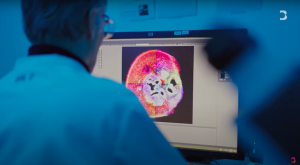Researchers at the LCSB are modelling the complexity of the human brain in a dish. Their work is highlighted in the latest episode of Primer, a new global series from Bloomberg Originals that breaks down the complex science, technologies and industries shaping the future. Aired on 27 March, this episode is titled “Can Living Human Brain Cells Power AI?”
The 30-minute video explores the world of biocomputing, where scientists are laying the foundation for a field that may blur the lines between the biological and synthetic. It features the work of start-up and biotech companies such as Cortical Labs in Australia and FinalSpark in Switzerland, as well as research conducted at the University of California San Diego, at Johns Hopkins University and at the University of Luxembourg.
This fascinating episode highlights the relevance of research conducted by Prof. Jens Schwamborn and his team at the Luxembourg Centre for Systems Biomedicine (LCSB). Since 2015, the Developmental & Cellular Biology group has been working with brain organoids, 3D cell cultures, to model physiological and pathological processes in the brain. By developing these complex in vitro models that recapitulate as much as possible the human brain, the researchers aim to better understand Parkinson’s disease and find new ways to treat a disease that is increasingly impacting our society.
While neurodegenerative processes are at the heart of the team’s work, they are also venturing into the brand-new field highlighted by the Primer episode: Organoid intelligence. With the COMPUTE project, supported by the Fondation du Pélican de Mie et Pierre Hippert-Faber, the LCSB researchers want to harness the computing power of brain tissue. They will make use of the LCSB expertise in 3D cell cultures to produce a biological processer unit based on stem cell-derived brain organoids.
“According to a recent scientific publication, a single human brain is a million times more energy efficient than a traditional computer,” underlines David Smeele, doctoral researcher in the Developmental & Cellular Biology group. “Considering the enormous energy demands of today’s computers, brain organoid-based computers could be a major game changer when it comes to more climate friendly technologies, with similar or higher performances.” So, our future might one day include a novel generation of biocomputers combining the advantages of electronics, artificial intelligence and the exceptional computing capacities of the human brain.
